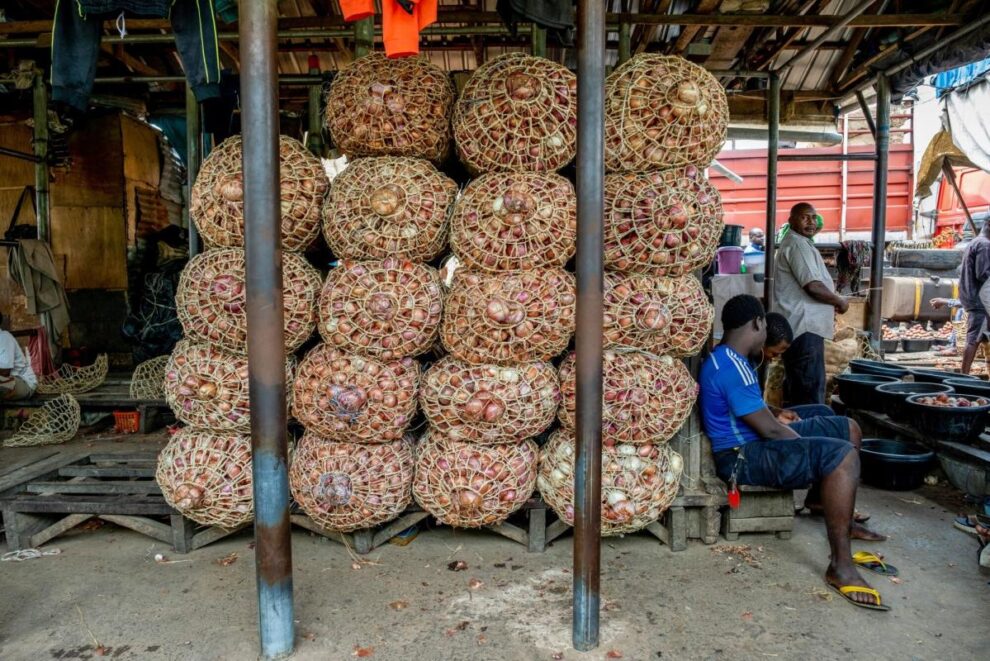Nigeria declared a state of emergency that will allow the government to take exceptional steps to improve food security and supply, as surging prices cause widespread hardship.
The move will trigger a range of measures, including clearing forests for farmland to increase agricultural output and ease food inflation, Dele Alake, a spokesman for President Bola Tinubu, told reporters late Thursday. It follows the president’s removal of fuel subsidies and exchange-rate reform, which has seen the naira fall by 40% after its peg to the dollar was removed last month.
Even before Tinubu cut subsidies, consumer-price growth had accelerated to an almost 18-year high of 22.4% in May in the West African nation, with the rate of food inflation rising more than two full percentage points faster in the same month.
While reforms are causing pain on the streets, they have led to rally in the country’s dollar bonds and a surge in stock prices to the highest level in 15 years as investors see the government’s decision on the currency as necessary to boost economic growth.
The World Bank forecasts economic growth could quicken to 4% from 2024 from an average of 2% since 2015. Nigerian eurobonds continued to rally on Friday, with yields on those due in 2031 declining for a fifth day to around 10.46%.
Still, currency weakness has added to pressures on the cost of living in the West African nation, where spending on food is a large part of most household budgets.
The price of food surged by more than 20% in sub-Saharan Africa in the period between 2020 and 2022, according to the International Monetary Fund, partly reflecting global trends and the fact the region imports many of its top staples.
For Nigerians, it is becoming unaffordable to a majority of the country, Alake said. “This has led to a significant drop in demand, thereby undermining the viability of the entire agriculture and food value chain,” he said.
Africa’s most populous nation has seen a jump in the cost of food and transportation since the fuel subsidies were ended, which were costing as much as $10 billion a year but made gasoline prices one of the cheapest globally.
The government will use the savings from the removal of the subsidies to revamp the agriculture sector, Alake said.
The measures might not go far enough, according to Ayo Teriba, the chief executive officer of Economic Associates Ltd., a Lagos-based advisory firm.
He argued the new government should declare an emergency in all sectors of the economy including power, security and petroleum, as well as food, because they all need urgent attention.
“We can’t continue to be doing it piecemeal,” Teriba said.
Planned Measures
Under the emergency measures, a National Commodity Board will be created to continually review food costs, maintain a strategic reserve and moderate spikes and dips in prices while the central bank will continue its funding of the farming sector.
In addition, the government plans to release 500,000 hectares from land banks, including by clearing forested areas, to increase available farmland and boost agricultural output.
The removal of fuel subsidies could lead to a further acceleration in the price index to nearly 30% by end of the year, according to Bank of America’s sub-Saharan Africa economist Tatonga Rusike.
Nigeria is scheduled to release June inflation data on Saturday.
Years of insecurity and recent flooding in the country’s north central region, which is the nation’s main food producing areas, have reduced farming activities, leading to a sharp rise in prices.
An indication of the emerging price pressures can be seen in the sharp rise in food costs in Borno State in northern Nigeria, where prices jumped 36% and transportation fares 78%, one week after the subsidies were cut, according to a report by Mercy Corps, a humanitarian organization operating in the area.
This has led to increase in hunger and petty theft at the community level, according to the report.
“More people are resorting to walking long distances instead of using motorized transport, and some students have stopped attending school due primarily to high transportation costs,” according to the report.
Source: Yahoo Finance
















